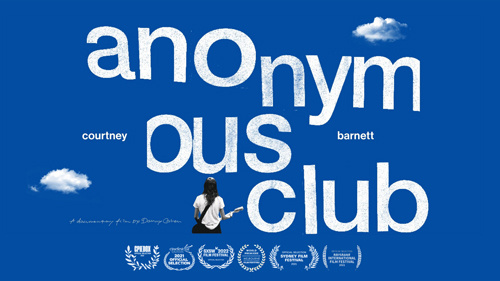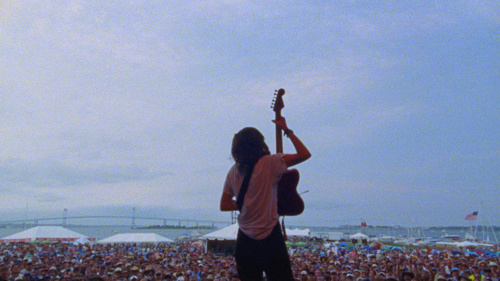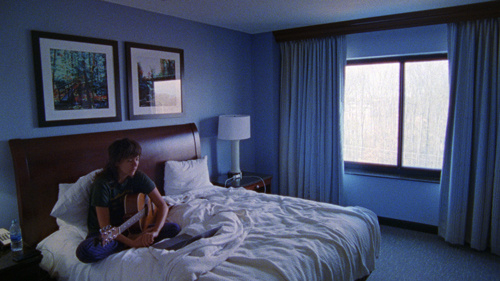Features
Courtney Barnett Finds Her Purpose
New Documentary Film Takes You Inside Her Battle with Self-Doubt
by Jason Warburg
One of my favorite t-shirts is one I’ve never actually encountered in the wild, though it’s described in Jessica Bruder’s Nomadland. It reads “Introverts unite! We’re here, we’re uncomfortable, and we want to go home.” I can relate to that, and so can Courtney Barnett.
Since first gaining notice with her A Sea Of Split Peas double EP in 2013, Barnett has steadily built an audience for her witty, self-deprecating tunes, typically framed by her laconic vocals and dynamic guitar playing. Already something of a unicorn as a left-handed female Australian guitar ace / singer-songwriter, Barnett is also intensely shy. Take all that and add in the reality-warping existence of a touring musician with a substantial following, and you can appreciate why the documentary film her friend Danny Cohen has made about her is called Anonymous Club—not only is it the name of one of her early songs, it’s likely the only kind of club Barnett would ever want to join.
 Cohen, after directing several of his friend’s music videos, suggested a documentary film. And while it took time for Barnett to warm up to the idea, after a while she consented to Cohen filming her in offstage environments and began to record her thoughts on a dictaphone that he gave her. (Says Cohen: “I gave her the idea that if it made her feel more comfortable, she could pretend she was talking to me, so it creates a connection there. Over time, she got really comfortable with it and just went deeper and deeper and deeper.”)
Cohen, after directing several of his friend’s music videos, suggested a documentary film. And while it took time for Barnett to warm up to the idea, after a while she consented to Cohen filming her in offstage environments and began to record her thoughts on a dictaphone that he gave her. (Says Cohen: “I gave her the idea that if it made her feel more comfortable, she could pretend she was talking to me, so it creates a connection there. Over time, she got really comfortable with it and just went deeper and deeper and deeper.”)
The resulting film is revelatory in the best sense, a view into the mind of a talented creative that exposes every insecurity and moment of self-doubt while pushing steadily toward a reckoning in which young Barnett—who reaches her 31st birthday during the film—shoulders past her own misgivings to gain a measure of self-knowledge.
The film opens as Barnett heads out on tour in support of her second album, 2018’s Tell Me How You Really Feel. It’s clear that promotion is the last thing she wants to do; she’s ambivalent about the merits of her latest release, a somewhat less raucous and more introspective collection than her smash 2015 LP debut Sometimes I Sit And Think And Sometimes I Just Sit. And the demands of the road on a shy and sensitive artist veer between torture and absurdity, as in the vignette where a well-meaning but overzealous fan presses her to write one of her lyrics on his t-shirt, reading it out to her word by word, and then instructs her to write her name at the bottom—saying out loud “Courtney Barnett,” as if that name belongs to him and not her. And maybe, in a way, in that particular moment, it does.
Cohen’s approach to the film veers between slice-of-life verisimilitude and deeper moments where he mutes the footage he’s captured and overlays it with the stream-of-consciousness monologues Barnett has left for him on the dictaphone. The ones he’s chosen to include grow increasingly vulnerable over the first half, then gain strength and perceptiveness through the second half as Barnett advances toward a measure of hard-won self-knowledge.
In the early going, Barnett battles depression and imposter syndrome while navigating through one concert stop after another across America:
“One day it can be so totally liberating and electric and energetic and alive. And then another day it can just be so rigid and full of fear and feel so far away. Going through those motions and playing the songs and then just having this whole other narrative running in my head about how everyone is standing still and thinks I’m a complete joke and talentless. Because I see myself trying to go through these motions of what you’re supposed to do, what people expect you to do. It’s like that unwritten rule on stage to walk to the front and put your guitar in the air and then that corner of the crowd screams. It feels like I’m being part of the scripted performance of what we think we’re supposed to see on stage and it just feels so pointless.”
Cohen positions this monologue against slow-motion footage of Barnett rocking out on stage, to great effect.

Barnett’s self-doubts become active self-laceration when she’s required to do press interviews.
“I don’t know how to say these things I want to say and I know I end up sounding like a fuckin’ moron. To be completely honest I feel like I’ve let myself down somehow with the release of this album. What could have been a fantastic conversation around fragility and depression and mental health ended up being swept to the side because I was too scared to talk about anything real or heavy. I get frustrated with myself, why can’t you just be a strong powerful communicator?”
The irony being that she communicates eloquently and forcefully through her songs—it’s just that, like so many world-class creatives, she’s dogged by the sense that she could have, should have done even better.
As the tour goes on, Barnett learns to be more accepting of her own moods. “I woke up having one of those just-feeling-sad days. Which is okay. I think sometimes it’s okay to feel sad and just keep on with what you’re doing.” As he should, Cohen segues this bit straight into Barnett back on stage singing “Take your broken heart / Turn it into art...”
This acceptance allows Barnett space to train her sights on the larger issue: why make art at all?
“I was thinking on the plane, I still don’t know why I write, or why I put all this energy into this thing that I do, that we do. Sometimes it’s hard to comprehend if it’s a waste of energy. I don’t know what my true intention is. I don’t know if I’m trying to impress someone, or if I’m trying to get vengeance for someone who picked on me once in my life or trying to make someone proud or trying to prove someone wrong… or just trying to make someone feel something… or if I’m just trying to make myself feel something.”
Cohen pairs this insightful voiceover with footage of a trip to Niagara Falls, its raging waters cascading over the edge into oblivion. Oof.
Not long after, in one of the backstage bits toward the middle of the 90-minute film, Barnett reads Cohen a haiku from her notebook:
Please leave me alone
No, give me attention please
I am so lonely
And there it is. With this flash of insight—the simultaneous connectedness and solitude of the spotlight being what draws an introvert toward it—Barnett begins to turn a corner in her journey. One minute she’s saying that “I just don’t see the point in doing this. I don’t think I’m at a place where I can help anyone because I can’t even seem to help myself.” The next she’s “just had one of those revelation moments. I have this real feeling that I need to change something. I need to make a big change or lots of big changes… I think when a feeling like that comes you need to just trust it and trust your instinct. Trust your gut.”
Once Barnett begins to trust her inner voice, the cloud begins to lift and “I feel like everything is starting to make more sense.” One key is recognizing and releasing the pressure she puts on herself—"Letting go of the idea that what I’m doing is the most important thing in the world. Not to give it no credit, but it’s true, there’s no point working up these big walls of catastrophe and disaster over creation.”

As the tour comes to an end and Barnett returns home to begin work on what would eventually become 2021’s Things Take Time, Take Time album, her sense of direction sharpens. We see her working on new material and the tension in the room is so diminished from the film’s early scenes, it’s like watching someone find the magic groove they’ve been searching for all this time.
Like every documentary, Anonymous Club ends before the story is truly over, as the camera switches off while the principals’ lives go on. Still, this organic, stream-of-consciousness film manages to wrap on an optimistic note, as Barnett finds her sense of purpose:
“I think I’ve figured out that my eternal goal is to empower people who need empowering. To communicate ideas and stories and emotions to give someone in the audience the energy or the power to feel something, to forget something, to remember something. To be inspired. To feel happiness or to feel an emotion that allows them to transcend life and helps them in their journey.”
Amen. Anonymous Club is a film for anyone who’s ever wanted to create and found that the greatest obstacle they faced was their own self-doubt. I recognized myself in Barnett’s struggles, and chances are you will too.